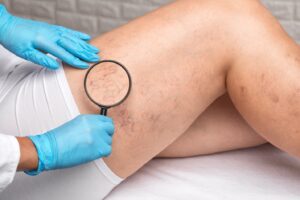What Causes Varicose Veins to Recur After Treatment?
Today’s treatments for varicose veins are minimally invasive and extremely effective. Often available as brief, outpatient surgical procedures, they typically eliminate varicose veins permanently. However, for some people, varicose veins do recur. Why does this happen? And should it discourage you from seeking treatment for your varicose veins?
 It helps to have an understanding of the vascular system. Your body has a network of arteries and veins moving blood around your body. The arteries carry oxygenated blood throughout the body, and the veins return the oxygen-depleted blood back to the heart so it can be refreshed, using valves that send the blood only in one direction. Most of the time, this system works beautifully. However, sometimes the valves weaken and allow the blood to pool in the veins, stretching the walls and causing varicose veins. Factors like age, obesity, and a sedentary lifestyle all increase the risk of this happening.
It helps to have an understanding of the vascular system. Your body has a network of arteries and veins moving blood around your body. The arteries carry oxygenated blood throughout the body, and the veins return the oxygen-depleted blood back to the heart so it can be refreshed, using valves that send the blood only in one direction. Most of the time, this system works beautifully. However, sometimes the valves weaken and allow the blood to pool in the veins, stretching the walls and causing varicose veins. Factors like age, obesity, and a sedentary lifestyle all increase the risk of this happening.
Here are some reasons you might get varicose veins again after treatment:
- You might need more than one treatment. Sometimes blood pools in more than one vein. If one vein is treated to cause the blood to flow to healthier veins, it’s possible for an untreated vein to become a varicose vein. Your doctor can use ultrasound to detect all the affected veins and treat as many as possible at one time.
- Your genetic predisposition may be working against you. Some people are naturally at a higher risk of developing chronic varicose veins. Fortunately, your vein specialist can offer solutions and suggest lifestyle changes that will help ease the symptoms prevent varicose veins from recurring or increasing in number.
- You may have developed new risk factors. Sometimes factors emerge after the initial treatment. For instance, you may have become pregnant, gained weight, or taken up smoking, all of which increase your risk of developing varicose veins. Your vein specialist will help you determine how to minimize your risk factors and decrease the odds of recurrence of your varicose veins.
- Sometimes, varicose veins reopen. Varicose vein treatment eliminates blood flow to the affected vein. However, sometimes after treatment a vein can open and begin to pump blood again. Additionally, your body can build new blood vessels after you’ve been injured or had surgery, which can lead to the development of new varicose veins.
Does this mean that you should refrain from getting varicose vein treatment? Not at all. Varicose veins are unsightly and uncomfortable, and they can lead to more serious issues if left untreated. Treatment is typically very effective, and the results are usually permanent.
Whether it’s your first time with varicose veins or you’re experiencing a recurrence, the board-certified physicians at the Arizona Vein & Laser Institute offer the very best care for your vein and blood flow issues. Using the most advanced technology, the vascular and cardiovascular surgeons at the Arizona Vein & Laser Institute provide care for all types of venous diseases. With over 40 years of experience, our team of experienced physicians can devise the right treatment plan to address your venous disease problems. For more information contact us through our website.
